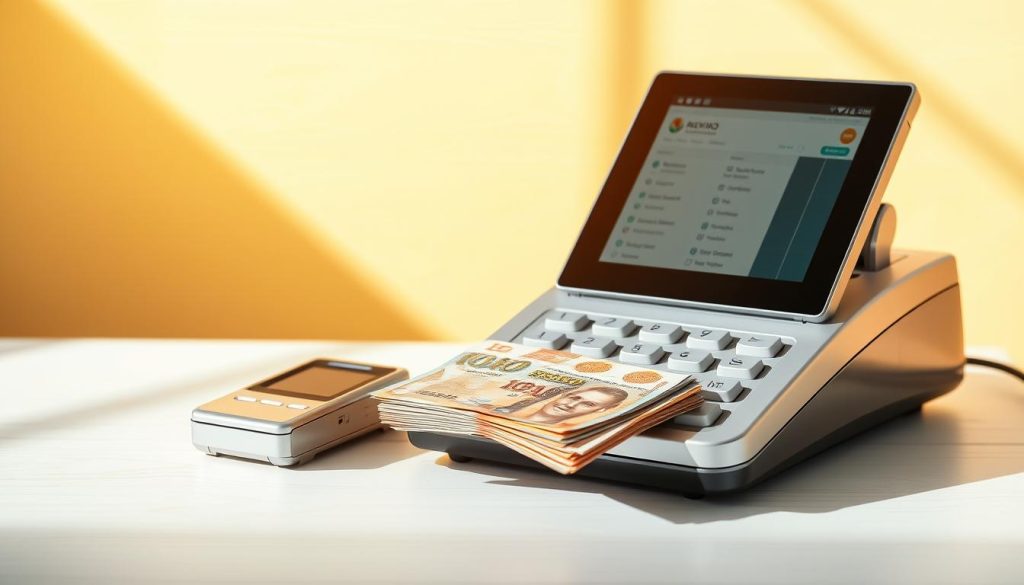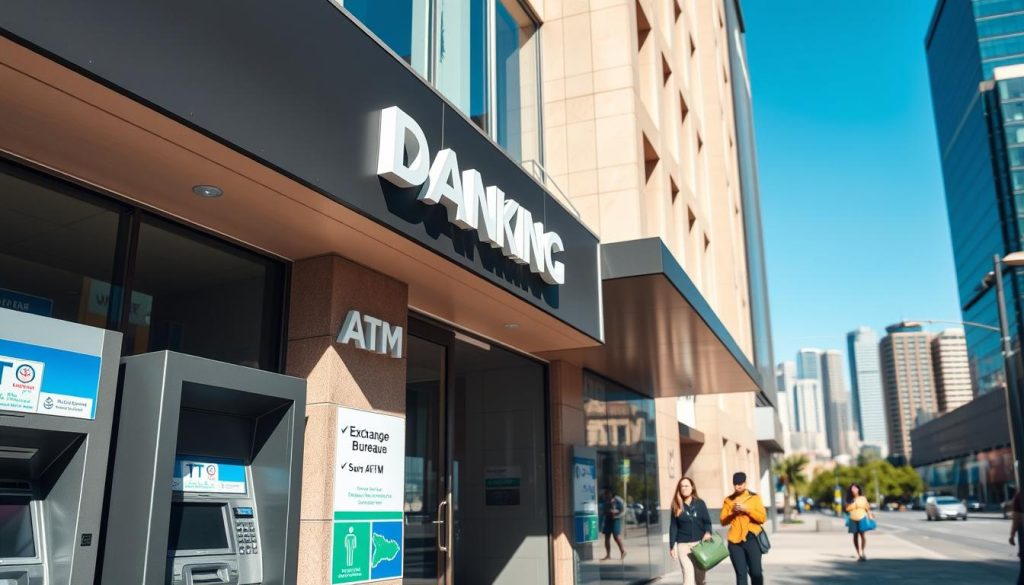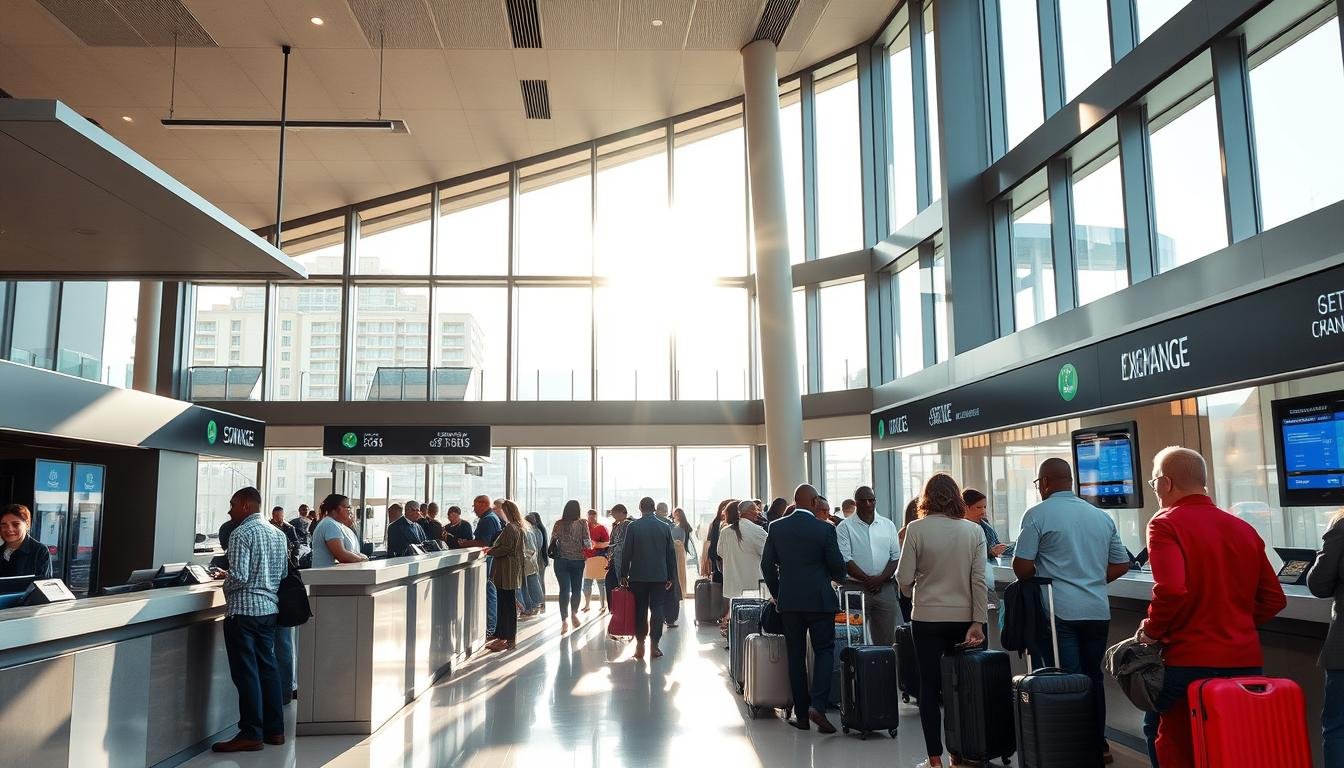Did you know that traveling across South Africa can cost up to 40% less than in the US or Western Europe? This makes it an incredible destination for adventurers on a budget. However, managing your money wisely is key to making the most of your trip.
Using the local currency, the South African Rand (ZAR), ensures you get the best exchange rate and avoid unnecessary fees. Whether you’re exploring bustling cities or serene landscapes, having a mix of cash and cards is essential. ATMs are widely available, but always check for international transaction fees.
This guide will help you navigate payment options, from credit cards to mobile payments, so you can focus on enjoying your journey without worrying about money matters.
Understanding South Africa’s Currency Landscape
Understanding the local money system can make your trip smoother and more enjoyable. The South African Rand (ZAR) is the official currency, and it’s essential to familiarize yourself with its denominations and usage.
Local Currency Basics and Denominations
The Rand is divided into coins and notes. Coins range from 5 cents to R5, while notes come in R10, R20, R50, R100, and R200. Knowing these denominations helps you budget and pay efficiently.
Using ZAR is crucial for minimizing fees. Paying in foreign currencies like USD often results in poor exchange rates. Always opt for local cash or card payments to save money.
The Role of the South African Rand in Daily Transactions
The Rand is widely accepted across the country, from bustling cities like Cape Town to rural areas. In markets and public transport, cash is often the preferred payment method.
ATMs and banks are your best friends for accessing ZAR. They offer favorable rates and ensure you have the right currency for your needs. Always check for international transaction fees before withdrawing.
- Coins: 5c, 10c, 20c, 50c, R1, R2, R5
- Notes: R10, R20, R50, R100, R200
By understanding the local money system, you can navigate transactions with ease and focus on enjoying your trip.
Mastering Money: Card and Cash Payment Methods in South Africa
Managing your finances efficiently is crucial for a smooth travel experience. Whether you’re dining at a restaurant or shopping at a local market, choosing the right payment method can save you time and money. Let’s explore the pros and cons of using cards versus cash and when to opt for each.
Benefits and Drawbacks of Using Cards
Using a credit card or debit card offers convenience, especially for online bookings and larger purchases. Major brands like Visa and Mastercard are widely accepted, making them a reliable option. However, be aware of potential fees, such as foreign transaction charges, which can add up quickly.
Another concern is fraud. While cards provide security features, they can still be vulnerable to scams. Notify your bank before traveling to avoid blocks on your card. Here’s a quick comparison:
| Payment Method | Pros | Cons |
|---|---|---|
| Credit/Debit Cards | Convenient, widely accepted, secure | High fees, fraud risks |
| Cash | No fees, accepted everywhere | Risk of theft, no recovery if lost |

When to Opt for Cash and How to Stay Secure
In some situations, cash is the better choice. Small vendors, public transport, and rural areas often prefer it. Carrying cash also helps you avoid exchange rate markups and fees associated with card usage.
However, carrying large amounts of cash can be risky. To stay safe, keep your money in a secure place and only carry what you need for the day. Use ATMs in well-lit, secure locations to withdraw local currency.
Here are some tips for managing cash and cards:
- Use fee-free ATMs to minimize withdrawal charges.
- Check your card’s overseas fees before traveling.
- Split your money between cards and cash for flexibility.
By understanding these payment options, you can make informed decisions and enjoy a stress-free trip.
South Africa: Ultimate Travelers Guide to Currencies & Payments – Money Options for Tourists
Navigating your financial needs while traveling can be simple with the right planning. Knowing where and how to access funds ensures a smooth experience. This section covers the best ways to manage your money during your trip.
Accessing Funds Through ATMs and Exchange Bureaus
ATMs are widely available in airports, cities, and malls. Major banks like FNB, Standard Bank, and Capitec offer reliable services. Using these ATMs ensures you get the best exchange rate for your currency.
Exchange bureaus in the city often provide better rates compared to airports or hotels. They also charge lower fees, making them a cost-effective option. Always verify the rate before making a transaction.

| Option | Pros | Cons |
|---|---|---|
| ATMs | Convenient, widely available, favorable rates | Potential withdrawal fees |
| Exchange Bureaus | Better rates, lower fees | Limited locations, longer wait times |
Pre-arrival Suggestions for Handling Cash Needs
Bring a small amount of ZAR for immediate expenses like transport or tips. Plan to withdraw more cash locally to avoid high conversion fees. This approach ensures you have enough money without carrying large sums.
Consider using travel money cards as a backup. These cards are preloaded with foreign currency and can be used at ATMs or for card payments. They offer security and flexibility for your trip.
Here are some practical tips:
- Use apps to locate ATMs with low withdrawal fees.
- Notify your bank about your travel plans to avoid card blocks.
- Split your funds between cash and cards for added security.
By following these suggestions, you can manage your money efficiently and focus on enjoying your travels.
Efficient Currency Exchange Strategies for Travelers
Maximizing your travel budget starts with smart currency exchange strategies. By comparing rates and minimizing fees, you can save significantly during your trip. Let’s explore how to make the most of your money.
How to Compare Exchange Rates and Save on Fees
Start by tracking live mid-market rates using tools like forex apps. These apps provide real-time data, helping you avoid unfavorable exchange offers. Always compare rates at banks, bureaus, and online services before making a transaction.
For example, exchanging currency in city centers often offers better rates than airports. Avoid dynamic currency conversion when using cards, as it typically incurs extra fees.

Identifying the Best Times and Places to Exchange Money
Timing your exchange can also save you money. Exchange currency during weekdays when rates are more stable. Avoid weekends and holidays when rates may fluctuate.
Authorized bureaus in city centers are your best option. They offer competitive rates and lower fees compared to airport kiosks. Always verify the rate and fee structure before proceeding.
| Option | Pros | Cons |
|---|---|---|
| City Bureaus | Better rates, lower fees | Limited locations |
| Airport Kiosks | Convenient | Higher fees, poor rates |
| Forex Apps | Real-time rates, easy comparison | Requires internet access |
Here’s a quick checklist to ensure you get the best exchange deal:
- Use forex apps to track live rates.
- Compare offers at multiple bureaus and banks.
- Avoid dynamic currency conversion with cards.
- Exchange currency in city centers for better rates.
By following these strategies, you can save money and focus on enjoying your trip.
Avoiding Fees and Fraud: Safety Tips for Handling Money
Staying safe with your money while traveling is as important as planning your itinerary. Whether you’re using cash or cards, protecting your funds ensures a stress-free experience. Let’s explore smart strategies to avoid fees and fraud.
Smart Security Practices for Card and Cash Usage
When using cards, always keep your PIN secret and monitor your bank statements regularly. Notify your bank before traveling to avoid blocks on your account. For cash, split your funds between multiple secure locations, like a money belt and a hotel safe.

- Avoid displaying large sums of cash in public.
- Use ATMs in well-lit, secure locations to minimize risks.
- Opt for card payments in busy areas to reduce theft risks.
Tips to Prevent Fraud and Manage Risk in Busy Areas
Busy markets and crowded streets are hotspots for scams. Be vigilant and avoid distractions when handling money. Use front-pocket storage or discreet wallets to keep your funds safe. If you suspect a transaction is suspicious, trust your instincts and walk away.
Here’s a quick comparison of safe practices:
| Practice | Benefit | Risk |
|---|---|---|
| Using Cards | Convenient, traceable | Potential fraud |
| Using Cash | No fees, widely accepted | Risk of theft |
By following these tips, you can protect your currency and focus on enjoying your trip.
Budgeting and Payment Hacks for a Seamless Trip in South Africa
Smart budgeting and payment strategies can enhance your travel experience. Using the right tools and methods ensures you stay on track with your budget while enjoying your journey. Let’s explore how travel money cards and digital solutions can simplify your money management.
Why Choose Travel Money Cards?
Prepaid travel money cards, like those from Wise or Revolut, offer several advantages over traditional credit or debit cards. They often have lower exchange rates and minimal fees, making them a cost-effective option. Plus, they’re easy to reload and use internationally.
These cards also provide security. If lost or stolen, your funds are protected, unlike cash. They’re widely accepted, so you can use them for most transactions during your trip.
Digital Payment Solutions for Budget Tracking
Digital tools like budgeting apps can help you monitor your spending in real-time. Apps such as YNAB and Spendee allow you to link your accounts, track currency conversions, and set daily budget limits. This way, you can avoid overspending and stay on track.
Here’s how to make the most of these tools:
- Link your travel money card to the app for seamless tracking.
- Set alerts for low balances or unusual transactions.
- Use the app to compare exchange rates before making purchases.
Tips for Daily Budgeting and Cash Planning
Plan your daily spending by allocating funds for meals, transport, and activities. Use your card for larger purchases and keep cash for smaller vendors or emergencies. This approach ensures you’re prepared for any situation.
For cash withdrawals, use ATMs in secure locations to minimize risks. Avoid withdrawing large sums at once to reduce the chance of theft. Always have a backup card or emergency fund for unexpected expenses.
By combining travel money cards, digital tools, and smart planning, you can enjoy a stress-free and budget-friendly trip.
Conclusion
Handling your money wisely is key to a smooth and enjoyable trip. Using the local currency, ZAR, ensures you get the best exchange rate and avoid unnecessary fees. A mix of cash and cards offers flexibility, whether you’re shopping in bustling markets or dining in local restaurants.
Always compare rates before exchanging currency to save on fees. ATMs in city centers often provide better rates than those at airports. Notify your bank before traveling to avoid card blocks and stay informed about international transaction fees.
By blending digital and traditional payment methods, you can manage your budget effectively. Stay vigilant with your cash and cards, and plan ahead to make the most of your travel experience. Use this guide to navigate your money needs with confidence.
The above is subject to change.
Check back often to TRAVEL.COM for the latest travel tips and deals.
Here are some Tours & Sightseeing suggestions that might pique your interests!






